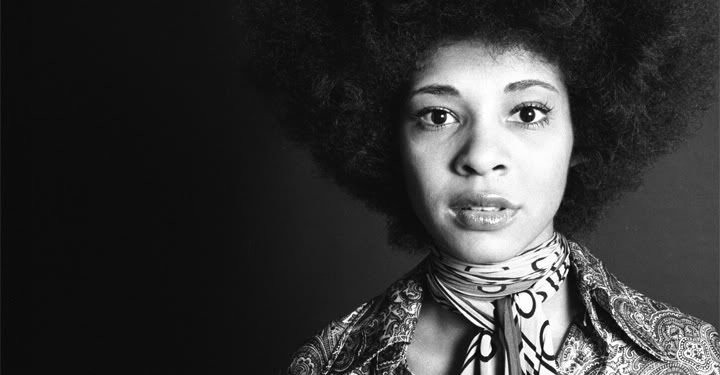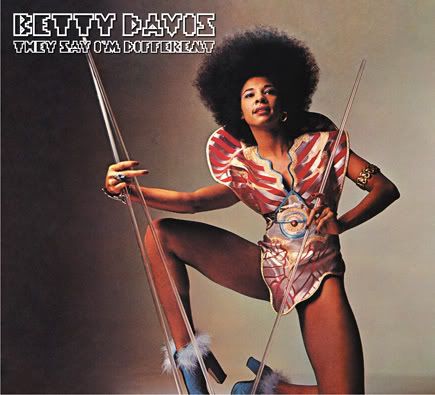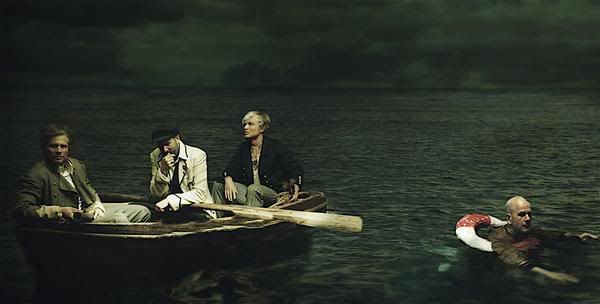
When someone says the name Betty Davis, the leading individual would call to mind the great screen actress famous for sharing an intimate smoke with her lover. But no, that's Bette Davis, and she has absolutely nothing to do with Betty Davis. For the latter is a funk jazz singer, one-time wife of Miles Davis- you know him, he's that fella with the horn- and she came into my field of knowledge through a fellow singer in the jazz ensemble to which I also lend my voice. This young woman went to the director inquiring if she could sing one of Davis' songs. His response was, "Who?" Coming from a jazz and classical musician, that he was not familiar with her was surprising, but rather telling of Davis' anonymity. This would only be reinforced soon thereafter, when the young woman searched for lyrics to her song and found nothing.
So who is Betty Davis, and why can't a person even find her lyrics? Sadly, the answer is that despite critical acclaim, she stopped making records after her first three flopped. She is now broke, apparently living in a ghetto in Pittsburgh.
When Betty Davis married Miles Davis in the late 1960s, she turned him onto the likes of Sly and the Family Stone and Jimi Hendrix, effectively influencing his sound for his seminal album, Bitches Brew, and kick-starting the Fusion genre. As much as she fascinated her husband, Miles Davis knew it couldn't last, as he said in his autobiography: “Betty was too young and wild for the things I expected from a woman...Betty was a free spirit, she was raunchy and all that kind of shit.”
After her marriage ended, she went on to form her own music, writing her own songs, including songs for the Commodores. At this time, it was incredibly rare for a female singer to be so independent. In fact, she had been offered a songwriting deal with The Commodores' record label, Motown, but had turned it down because Motown would hold to much control over her.
 She released her first self-titled album in 1973, with help from the rhythm section from Sly and the Family Stone and produced by their drummer, Greg Errico, future Journey guitarist Neal Schon, and backing vocals by the Pointer Sisters.
She released her first self-titled album in 1973, with help from the rhythm section from Sly and the Family Stone and produced by their drummer, Greg Errico, future Journey guitarist Neal Schon, and backing vocals by the Pointer Sisters.Her subsequent two albums were also written , as well as self-produced, by Davis, but neither of these caught fire with the public at large, for Davis was simply too progressive, too explicitly sexual, too aggressive. Religious groups would boycott her performances, which sometimes resulted in their cancellation. After her third album once again failed to make money, she disappeared. However, she didn't fall into total obscurity-- her style can be seen in Erykah Badu, Prince, Rick James, and more recently, Macy Gray.
Thankfully, Light in the Attic Records remastered and re-released her first two records, Betty Davis and They Say I'm Different, last summer, so I hope to God people are catching on to the powerhouse sex goddess that is Betty Davis.
LitA Records said this of her:
There is one testimonial about Betty Davis that is universal: she was a woman ahead of her time. In our contemporary moment, this may not be as self-evident as it was thirty years ago - we live in an age that's been profoundly changed by flamboyant flaunting of female sexuality: from Parlet to Madonna, Lil Kim to Kelis. Yet, back in 1973 when Betty Davis first showed up in her silver go-go boots, dazzling smile and towering Afro, who could you possibly have compared her to? Marva Whitney had the voice but not the independence. Labelle wouldn't get sexy with their "Lady Marmalade" for another year while Millie Jackson wasn't Feelin' Bitchy until 1977. Even Tina Turner, the most obvious predecessor to Betty's fierce style wasn't completely out of Ike's shadow until later in the decade
Miles Davis said:
"If Betty were singing today she be something like Madonna, something like Prince, only as a woman. She was the beginning of all that when she was singing as Betty Davis.”
Betty Davis' Last.fm profile, which has a large number of full tracks you can listen to.
Visit Betty Davis' Page on LitA Records and BUY HER MUSIC!


